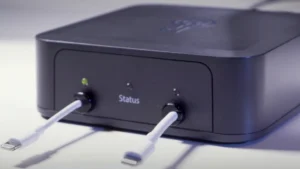New iOS 18.1 Security Feature Boosts iPhone Protection with Automatic Reboot
New iOS 18.1 Security Feature Boosts. iOS 18.1 introduces a powerful new security feature: an automatic reboot function that kicks in when iPhones are idle for an extended period. This “inactivity reboot” silently secures your iPhone when left unattended, further safeguarding personal information from potential threats. Drawing from similar features found on Mac devices, this feature demonstrates Apple’s commitment to elevating iPhone security. This post explores how it works, why it’s a game-changer for user privacy, and what it means for overall security.
What is the iOS 18.1 Inactivity Reboot?

The “inactivity reboot” is a security-focused feature that automatically restarts an iPhone when it has been locked and idle for an extended period—around 96 hours, or roughly four days. Unlike traditional reboots triggered by battery or power issues, this feature is entirely time-based. Apple’s goal appears to be to protect the iPhone’s data if it falls into the wrong hands, or if it is left unused for long periods.
This kind of reboot isn’t entirely new in Apple’s ecosystem. Macs use a similar “hibernation mode” feature, which saves the device’s state to disk when it goes into sleep mode, ensuring data safety even if the device loses power. The iPhone’s inactivity reboot, however, goes a step further by actively resetting the device to a safer, locked-down state rather than just preserving its current session.
How the Inactivity Reboot Works and Its Benefits

Apple’s new feature centers on enhancing data security when the iPhone remains unused for several days. After 96 hours of inactivity, the phone will reboot and switch to what is known as the “Before First Unlock” (BFU) state. When an iPhone is in BFU mode, it is much harder to access its data due to Apple’s encryption protocols. BFU mode is highly secure, as it locks out access to data and apps, requiring user authentication before any data is accessible.”
New iOS 18.1 Security Feature Boosts
Here’s a breakdown of the key stages involved:
- Idle Period Initiates Reboot: After a locked iPhone remains idle and unused for 96 hours, it automatically reboots. This reboot process is solely tied to the phone’s inactivity since the last unlock, meaning it doesn’t depend on charging, network connectivity, or other external factors.
New iOS 18.1 Security Feature Boosts - Transition to BFU State: During the reboot, the iPhone enters BFU mode. BFU limits access to device data, requiring user authentication before apps or files can be accessed. This “data-locking” process thwarts unauthorized access attempts that exploit device idleness.
New iOS 18.1 Security Feature Boosts - Enhanced Data Protection: BFU mode prevents data exposure, offering higher levels of security compared to the traditional locked state, known as “After First Unlock” (AFU). In AFU mode, some data remains accessible for notifications and other functions, whereas BFU shuts down nearly all data access.
New iOS 18.1 Security Feature Boosts - Protection Against Brute Force and Forensic Attacks: By regularly rebooting and entering BFU mode, the iPhone becomes more resilient to forensic tools and brute-force attacks used by malicious entities. This security enhancement not only discourages these attempts but also reduces the timeframe in which they can potentially be effective.
New iOS 18.1 Security Feature Boosts
How the Inactivity Reboot Prevents Unauthorized Access
A key motivation behind the iOS 18.1 inactivity reboot is to minimize unauthorized access risks if an iPhone is lost or stolen. When devices remain idle without user interaction, they are more vulnerable to unauthorized access by skilled hackers or forensic tools. However, the automatic reboot significantly limits these threats by resetting the device’s security state.
New iOS 18.1 Security Feature Boosts
Christopher Vance, a forensic expert at Magnet Forensics, explained that the iOS 18.1 feature initiates a timer within iOS that reboots devices after a certain idle period, transitioning from AFU to BFU. This reset effectively stops some forensic methods in their tracks, adding another layer of defense for users concerned about privacy and security.
New iOS 18.1 Security Feature Boosts
Why Inactivity Reboot is a Great Idea for iPhone Users
This feature benefits iPhone owners in several important ways:
- Enhanced Privacy Protection: iPhone users’ data is increasingly safeguarded from unauthorized access, even if a thief or hacker attempts to access it while idle. This feature takes the traditional lock screen security a step further by re-locking the phone in a more secure mode after prolonged inactivity.
- Defense Against Data Theft: As cryptographer Matthew Green from John Hopkins University notes, the primary threat isn’t always law enforcement but rather individuals who might steal an iPhone for malicious purposes. This feature ensures that iPhones can’t be “nursed” for months until cracking technology catches up—protecting personal data from long-term unauthorized attempts.
- Low Inconvenience, High Reward: For most iPhone users, the automatic reboot will go unnoticed in day-to-day use. Since it only triggers after an idle period of four days, it’s unlikely to disrupt normal usage. But for those situations where a device may be lost or left unattended, this feature becomes a crucial line of defense.
Addressing Concerns About Privacy and Security
With the release of iOS 18.1, Apple once again underscores its commitment to user privacy and security by preemptively blocking potential access points for bad actors. The inactivity reboot’s approach to automatic reboots could potentially raise questions from some users who might worry about unexpected restarts, but for most, this will be a non-issue due to the long idle period required.
Additionally, by incorporating this feature into the iOS system, Apple maintains the user-friendly nature of the iPhone while bolstering security. Rather than requiring users to adjust settings or manually enable this feature, it’s designed to work seamlessly in the background, making it easy to enjoy the benefits of enhanced security without extra effort.
What This Means for the Future of iPhone Security
The iOS 18.1 inactivity reboot represents Apple’s forward-thinking approach to mobile security, ensuring that iPhones remain secure even under unique circumstances. As data privacy concerns grow, features like this establish Apple as a leader in prioritizing security.
Future updates might build upon this framework by allowing users to customize inactivity time or offering additional security layers. While Apple’s decision to reboot based on idle time is innovative, there’s room for more customization options in future iOS versions, catering to both privacy-conscious users and those with specific security needs.
Final Thoughts: iOS 18.1’s Inactivity Reboot Delivers Added Peace of Mind
Apple’s latest iOS 18.1 update redefines the idle security landscape with its inactivity reboot feature, providing users with automatic, passive protection against unauthorized access. By adding this layer of security, Apple ensures that an idle iPhone is no longer a potential entry point for hackers or criminals.
This proactive approach enhances privacy without requiring user intervention and reflects Apple’s dedication to secure, user-friendly technology. If you’re looking to maximize iPhone security, updating to iOS 18.1 ensures that your data remains safe, even when your device is idle. Whether your phone is simply left unattended or lost, this powerful new feature gives you peace of mind and strengthens Apple’s commitment to safeguarding user privacy.
New iOS 18.1 Security Feature Boosts
New iOS 18.1 Security Feature Boosts
New iOS 18.1 Security Feature Boosts
